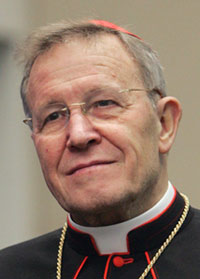 The title is a bit deceptive, I know, but it has some relevance. Nederlands Dagblad reports that the Catholic Church in the Netherlands will officially take part in the commemmoration of 500 years of Reformation. The program titled Refo500 builds up towards 2017, when it is 500 years since Martin Luther published his Ninety-five Theses. Since then, of course, the various (and increasingly numerous) Protestant church communities have gone their own way.
The title is a bit deceptive, I know, but it has some relevance. Nederlands Dagblad reports that the Catholic Church in the Netherlands will officially take part in the commemmoration of 500 years of Reformation. The program titled Refo500 builds up towards 2017, when it is 500 years since Martin Luther published his Ninety-five Theses. Since then, of course, the various (and increasingly numerous) Protestant church communities have gone their own way.
Much can be said about the Reformation from a Catholic point of view and the question may be asked of how useful it is to partake in an event that seemingly celebrates the fact that a significant number of Christians are no longer part of the one Church. What possible merit could their be in a Catholic acknowledgement of the Reformation as a good thing (because that is the point of celebrating, of course)?
Speaking for the Catholic Society for Ecumenism, Mr. Geert van Dartel says, “We think it is important that this commemoration is not one-sided, from a reformed standpoint. […] The Reformation was a process of action and reaction.”
He has a point. The Reformation directly led to the Counter-Reformation and the Council of Trent, which was a major impulse for the Church, and its influence is still visible. However, the Counter-Reformation, as the name implies, was very much anti-Reformation.
Karla Apperloo of Refo500: “We did not describe the term ‘Reformation’ when it comes to content. That allows space for a Catholic partner to also shine a light on the Catholic Reformation.”
Let’s hope that this space will be used for more than a mere focus on how much we have in common. That is important, of course, and the commonalities between the Church and church communities must be the basis for future ecumenism, but the differences can’t be ignored. The simple fact is that the gap between the Catholic Church and the Protestant church communities is bigger than that among any two Protestant communities. A focus on the Catholic Counter-Reformation and the Catholic identity, at least from the Catholic parties, will do more for ecumenism then a celebration of mutual friendship.
The Society for Ecumenism als states that: “The divisive meaning of the great theological questions from the 16th century […] have been superseded by faith.”
And that is a bit worrying, because it seems to indicate that faith alone is left, and that all the problems and divisions are gone. But they are not. The understanding of what makes a Church is radically different between Catholics and Protestants.
I noticed that myself during the conference of Christian student groups in Groningen, a few weeks ago. The various Protestant groups seemed to consider their brands of Christianity to be mere ‘tastes’ or ‘preferences’: it doesn’t really matter what sort of Christian you are , as long as it suits you. That approach makes the individual believer, and not God, the arbitrator of what faith and church are: they establish the church and decide what it should be. The Catholic sense of what the Church is is the total opposite: The Church has been instituted by Christ, and so He has the final power of decision. We are workers in His vineyard, but we can’t decide what His Church must be or do. The Holy Spirit does so through His people, but the initiative always lies with Him. The foundations of the Church have been given, not made by us. The Church is therefore much more than a taste of preference. It asks us to join Christ on His terms. It requires a certain level of faith and trust that through God we will find true freedom and life.
The differences are there, even in as summarised a version of the problem as mine above. We may share the same faith in Christ, but that does not mean we are all the same. In order to be the same, we must first now what ‘the same’ means.
Anyway, that’s a bit of a detour from the Refo500 events. Let’s hope and pray that a Catholic presence will make a difference. 500 years of Reformation is long enough. Time for the experiment to be over.



 The alleged pilgrimage site Medjugorje in Bosnia and Herzegovina has recently been in the news again. The site, where the Blessed Virgin Mary is said to have appeared virtually daily since 1981, was visited by Christoph Cardinal Schönborn, despite the fact that Rome does not acknowledge the apparitions as authentic. Local Bishop Ratko Peric had to explain that fact once more.
The alleged pilgrimage site Medjugorje in Bosnia and Herzegovina has recently been in the news again. The site, where the Blessed Virgin Mary is said to have appeared virtually daily since 1981, was visited by Christoph Cardinal Schönborn, despite the fact that Rome does not acknowledge the apparitions as authentic. Local Bishop Ratko Peric had to explain that fact once more.